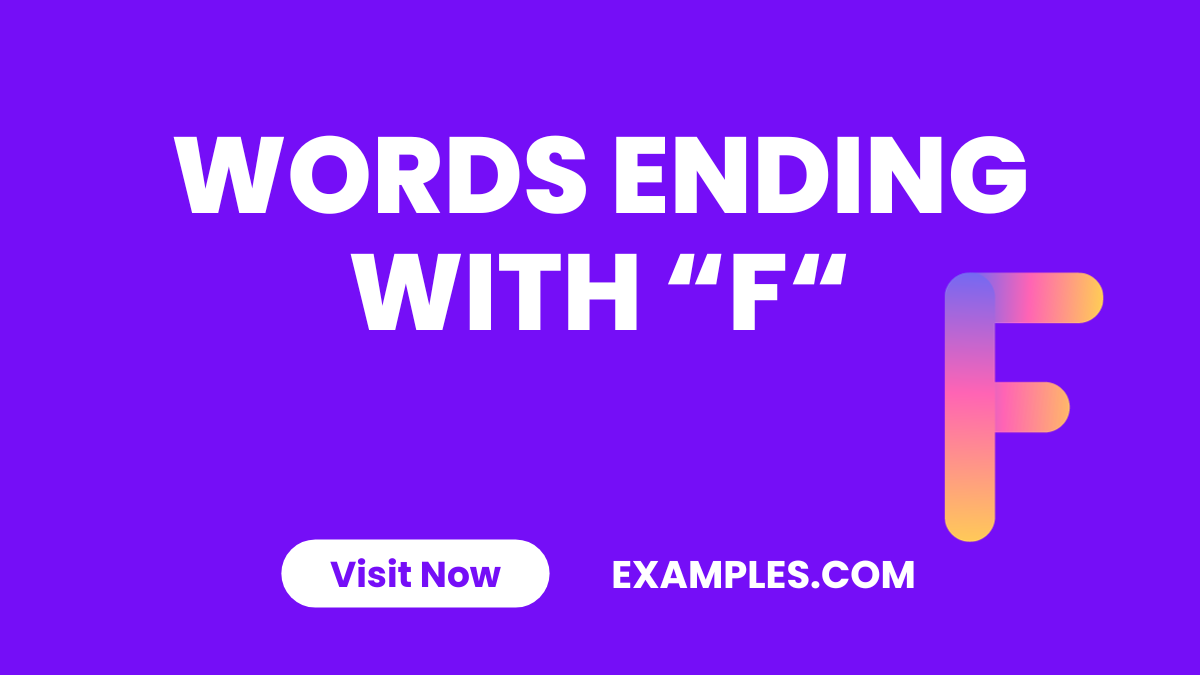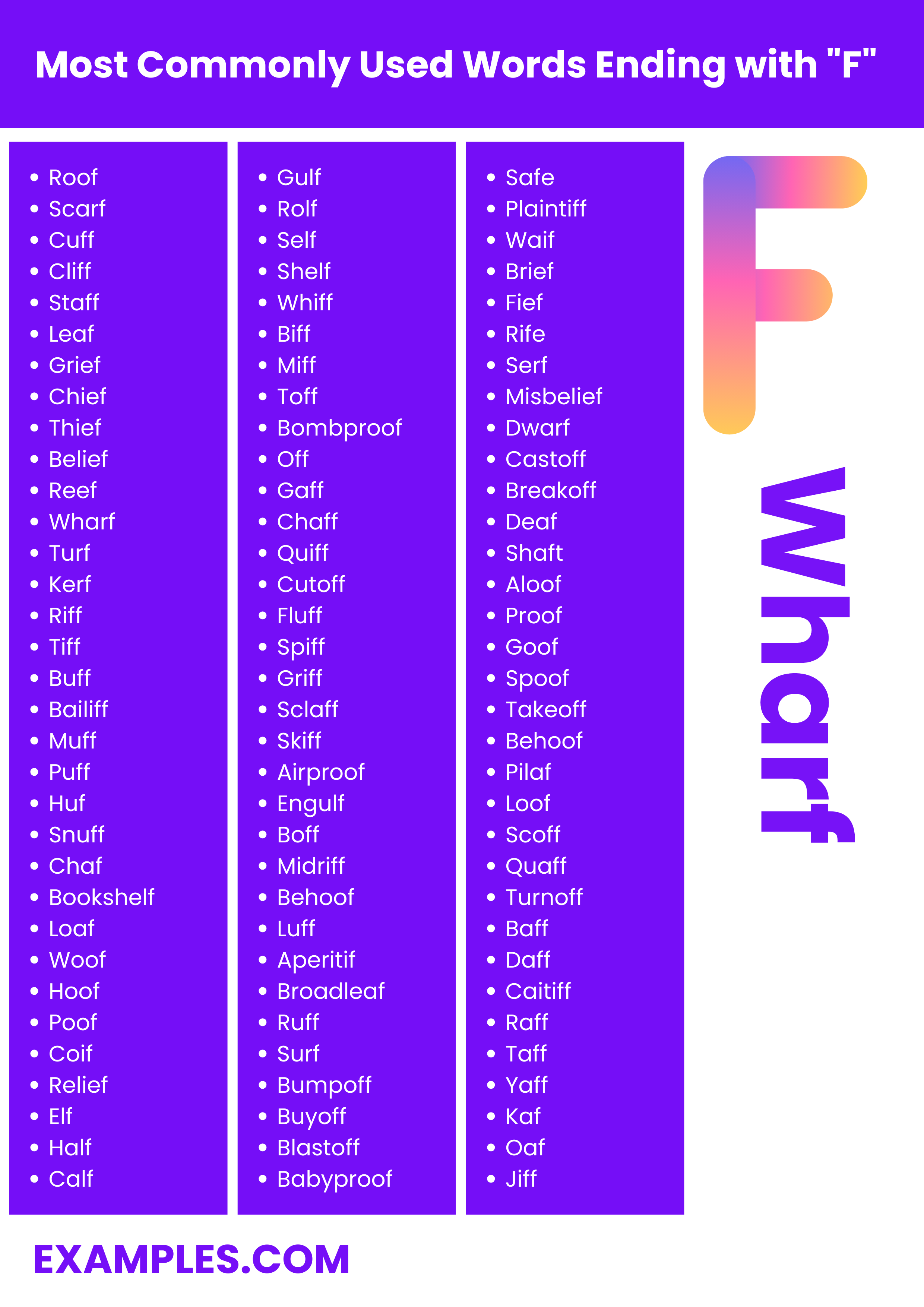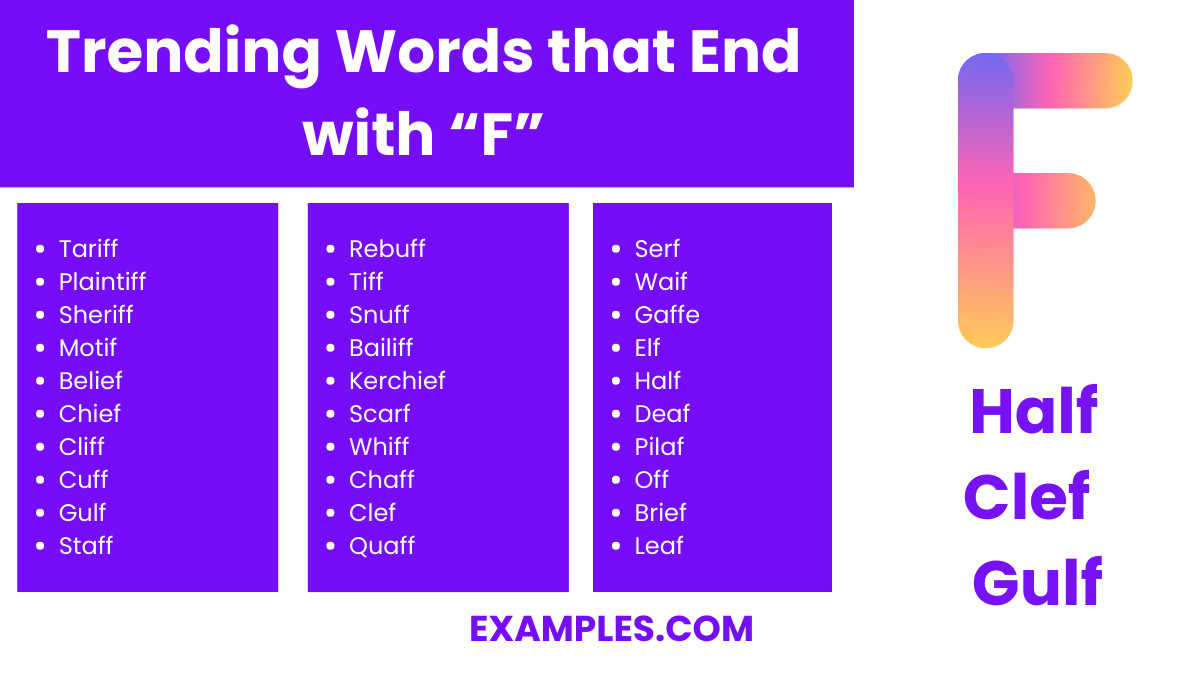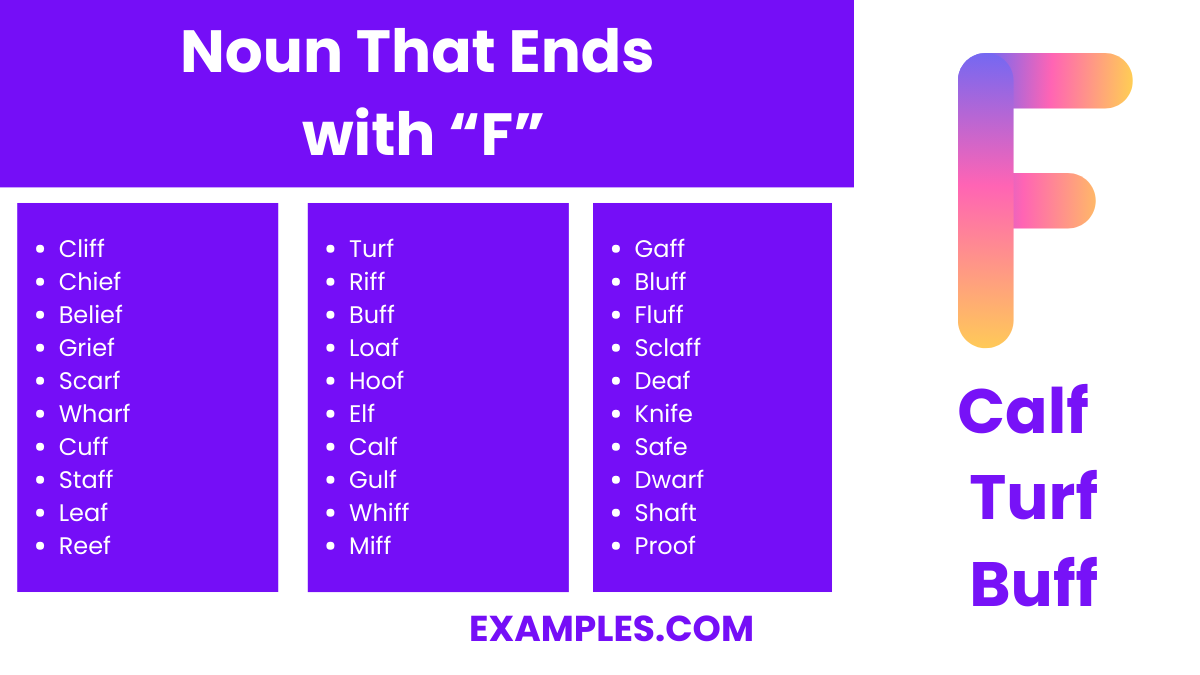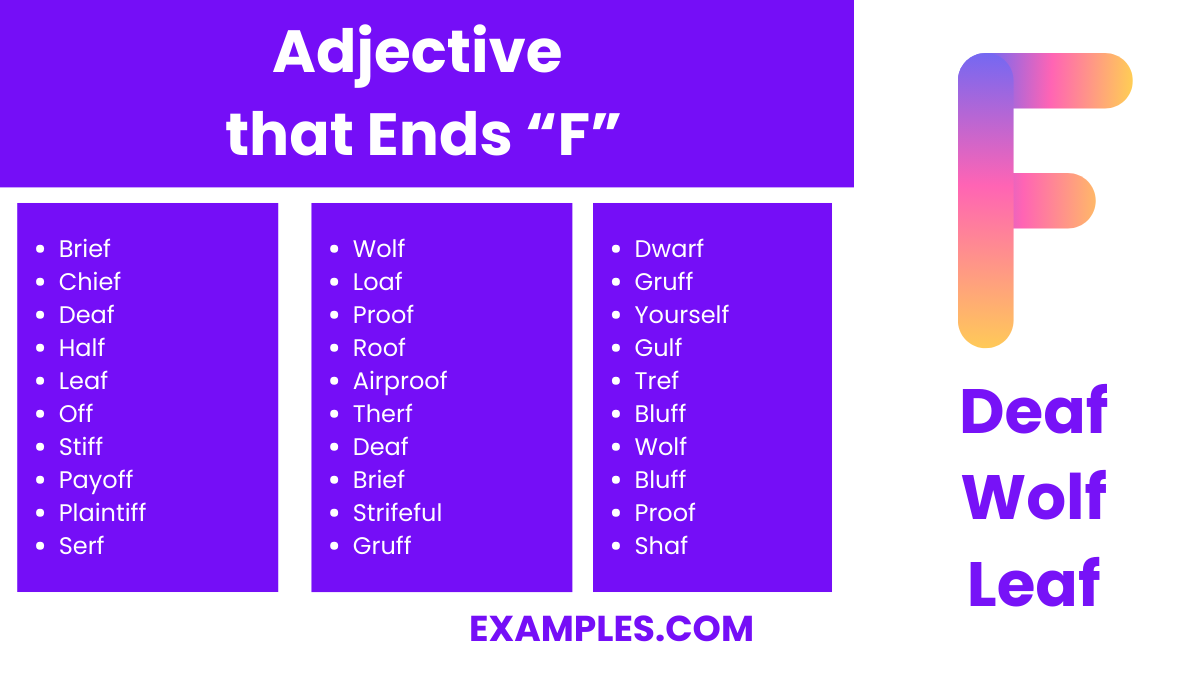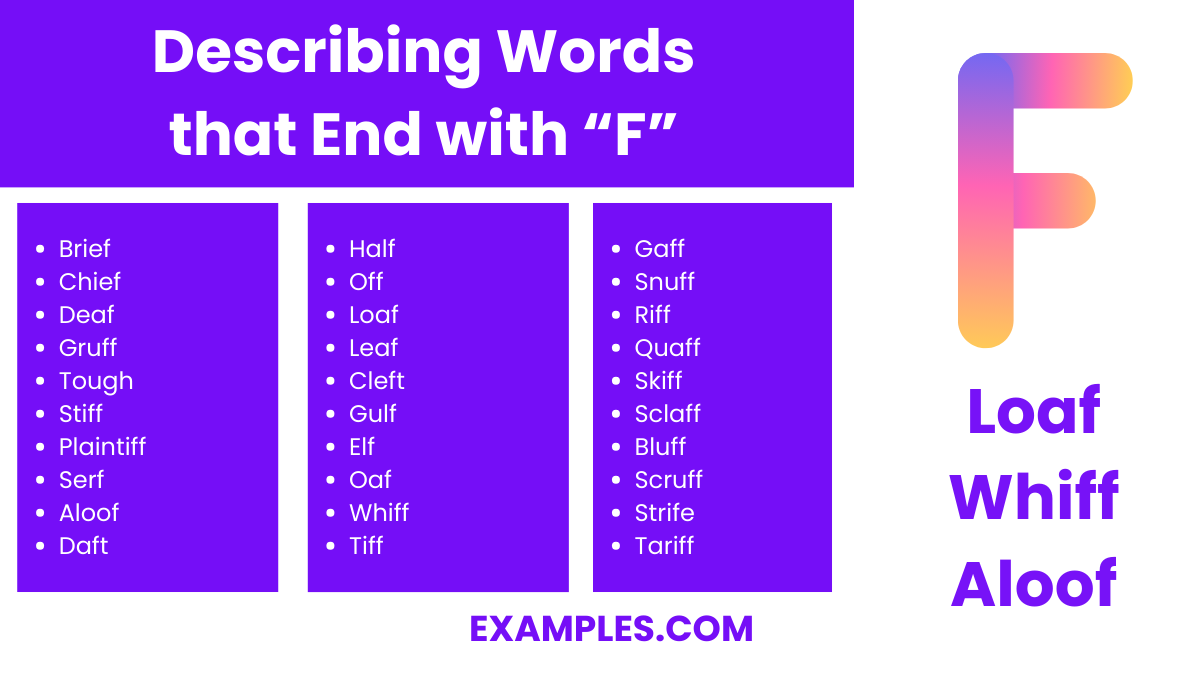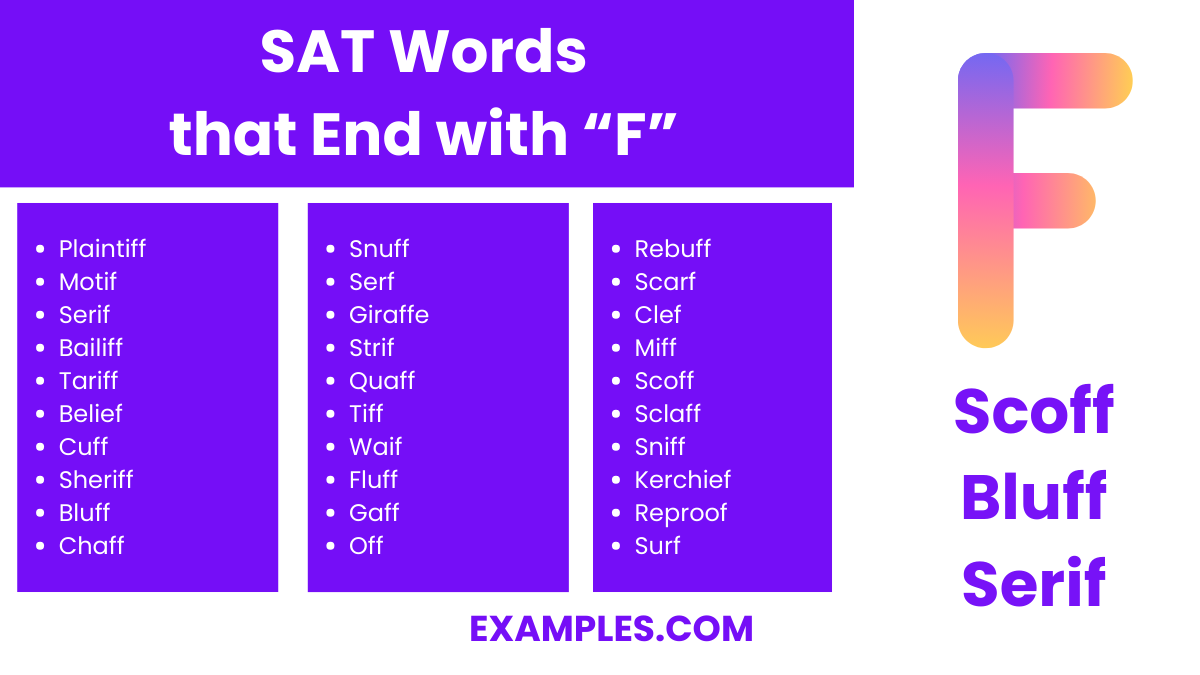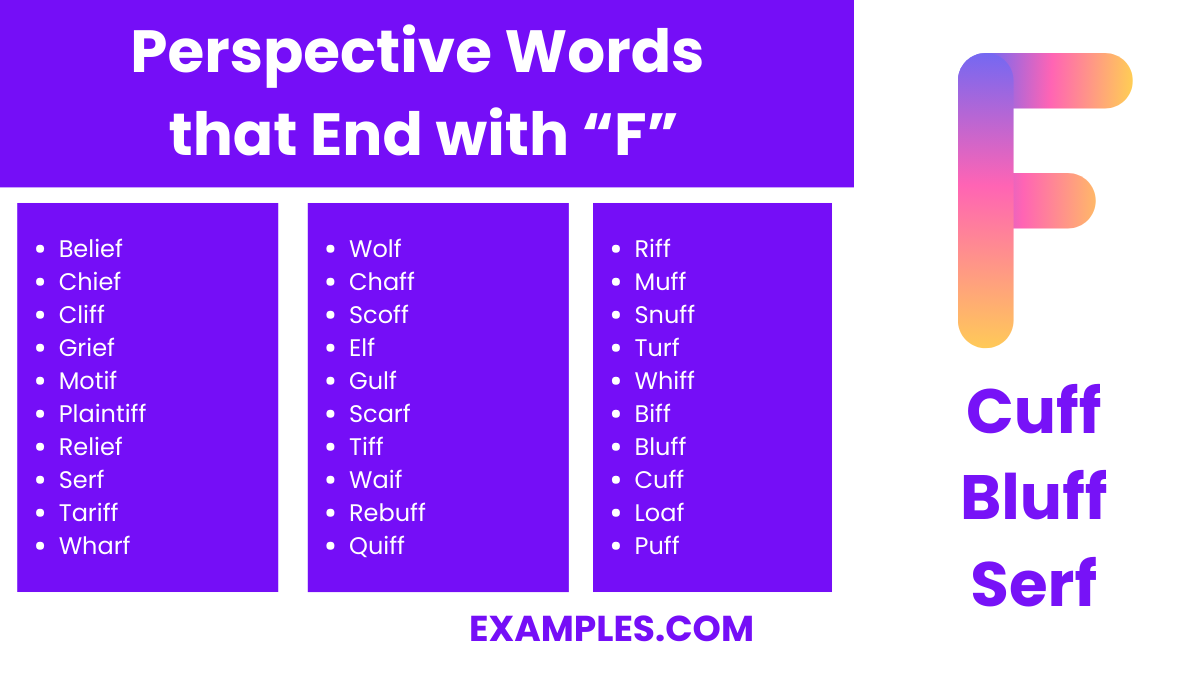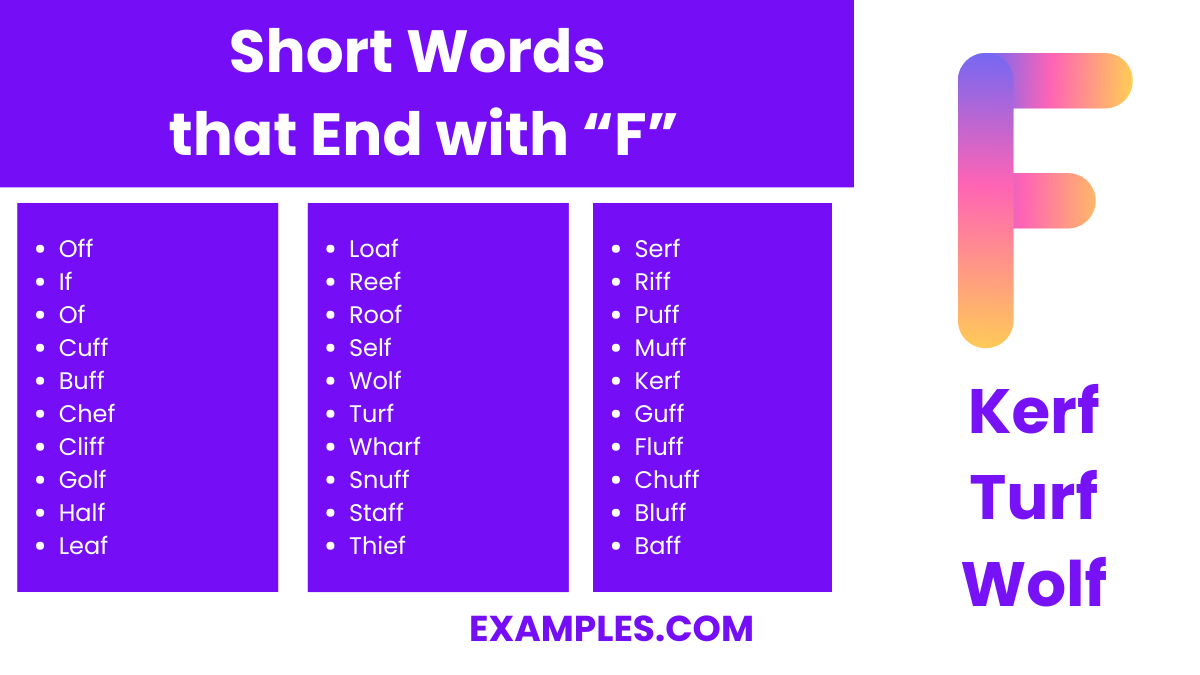150+ Words Ending with F List, Meaning, PDF
On a linguistic exploration of words ending with ‘F’ unveils a fascinating facet of the English language, marked by its phonetic uniqueness and semantic diversity. This intriguing set of terms, from the soft whisper of “leaf” to the impactful declaration of “belief,” showcases the versatility and richness of English. Each ending ‘F’ words, whether denoting tangible objects like “scarf” or embodying abstract concepts such as “grief,” adds depth and texture to our linguistic tapestry. Delving into this collection not only broadens one’s vocabulary but also enriches comprehension, offering insights into the nuanced interplay between sound and meaning that characterizes the ever-evolving landscape of language
Download Most Commonly Used Words Ending with F - PDF
150 Most Commonly Used Words Ending with “F”
When teaching English, one effective strategy is to focus on words ending in specific letters, such as ‘F’. This approach can significantly enhance students’ understanding of phonetics, spelling patterns, and word formation. Words ending in ‘F’ are particularly interesting due to their varied and sometimes unique sounds. They offer an excellent opportunity for students to explore different word endings and their effects on pronunciation and meaning. For teachers, this list of words ending in ‘F’ can be a valuable resource. It can be used to create engaging lessons in spelling, vocabulary, and even creative writing. Understanding and using these words can help students improve their communication skills and gain a deeper appreciation of the nuances of the English language.
| Roof | Scarf | Cuff | Cliff | Staff | Leaf |
| Grief | Chief | Thief | Belief | Reef | Wharf |
| Turf | Kerf | Riff | Tiff | Buff | Bailiff |
| Muff | Puff | Huf | Snuff | Chaf | Bookshelf |
| Loaf | Woof | Hoof | Poof | Coif | Relief |
| Elf | Half | Calf | Gulf | Rolf | Self |
| Shelf | Whiff | Biff | Miff | Toff | Bombproof |
| Off | Gaff | Chaff | Quiff | Cutoff | Fluff |
| Spiff | Griff | Sclaff | Skiff | Airproof | Engulf |
| Boff | Midriff | Behoof | Luff | Aperitif | Broadleaf |
| Ruff | Surf | Bumpoff | Buyoff | Blastoff | Babyproof |
| Safe | Plaintiff | Waif | Brief | Fief | Rife |
| Serf | Misbelief | Dwarf | Castoff | Breakoff | Deaf |
| Shaft | Aloof | Proof | Goof | Spoof | Takeoff |
| Behoof | Pilaf | Loof | Scoff | Quaff | Turnoff |
| Baff | Daff | Caitiff | Raff | Taff | Yaff |
| Kaf | Oaf | Jiff | Cookoff | Waterproof | Niff |
| Piff | Siff | Ziff | Diff | Creampuff | Guff |
| Huff | Behalf | Muff | Aardwolf | Chipproof | Tuff |
| Bluff | Blowoff | Gruff | Scuff | Snuff | Stiff |
Most Trending Words that End with F
In the dynamic realm of the English language, keeping pace with trending words is essential for impactful teaching. Concentrating on words that terminate with ‘F’ unveils a unique avenue to broaden students’ vocabulary with terms that resonate with contemporary usage and everyday dialogue. From casual vernacular to specialized jargon, these ‘F’ ending words mirror the fluidity of language and its reflection on current societal shifts. For educators, weaving these words into educational frameworks not only bolsters students’ verbal competencies but also ensures their engagement with timely and pertinent content. This compilation of trending words ending in ‘F’, encompassing Rhyming Words to enhance phonetic awareness and Daily Use English Words for practical application, is meticulously assembled to offer a versatile array that complements diverse pedagogical approaches, fostering comprehensive communicative proficiency among learners.
- Tariff – A tax or duty to be paid on a particular class of imports or exports.
- Plaintiff – A person who brings a case against another in a court of law.
- Sheriff – An elected officer in a county responsible for law enforcement.
- Motif – A decorative image or design, especially a repeated one forming a pattern.
- Belief – An acceptance that something exists or is true, especially without proof.
- Chief – A leader or ruler of a people or clan.
- Cliff – A steep rock face, especially at the edge of the sea.
- Cuff – The end part of a sleeve, where the material of the sleeve is turned back or a separate band is sewn on.
- Gulf – A deep inlet of the sea almost surrounded by land, with a narrow mouth.
- Staff – The employees of an organization.
- Rebuff – To reject someone or something in an abrupt or ungracious manner.
- Tiff – A petty quarrel.
- Snuff – Extinguish a candle by pinching or covering the flame with something.
- Bailiff – An official in a court of law who keeps order, looks after prisoners, etc.
- Kerchief – A piece of fabric used to cover the head or worn as a scarf.
- Scarf – A length of cloth worn around the neck or head.
- Whiff – A slight smell, carried on a current of air.
- Chaff – The husks of corn or other seed separated by winnowing or threshing.
- Clef – A sign placed at the beginning of a musical staff to determine the pitch of the notes.
- Quaff – To drink something heartily.
- Serf – An agricultural laborer bound under the feudal system to work on his lord’s estate.
- Waif – A homeless and helpless person, especially a neglected or abandoned child.
- Gaffe – An unintentional act or remark causing embarrassment to its originator.
- Elf – A supernatural creature of folk tales, typically represented as small, elusive, and having magical powers.
- Half – Constituting half of a standard or normal amount.
- Deaf – Lacking the power of hearing or having impaired hearing.
- Pilaf – A dish in which rice is cooked in a seasoned broth.
- Off – Away from the place in question; to the side.
- Brief – Of short duration; not lasting for long.
- Leaf – A flattened structure of a higher plant, typically green and blade-like.
Noun that Ends with “F”
Exploring nouns ending with ‘F’ unveils a captivating aspect of the English language, where each term, marked by the characteristic ‘F’ sound, enriches our vocabulary’s texture. For educators, this collection is invaluable for bolstering lesson plans, particularly within vocabulary and spelling drills. Every noun, from tangible items like “leaf” and “roof” to conceptual entities such as “belief” and “relief,” opens avenues into diverse themes and realms. Incorporating these nouns into classroom dynamics can substantially enhance students’ grasp of English nouns, thereby elevating their communicative prowess. This assortment, including Compound Words like “handcuff” that showcase linguistic creativity and Consonant Words such as “cliff” that emphasize phonetic depth, is more than an educational resource; it’s a catalyst for curiosity about word etymologies and applications across different discourses. Embark on this engaging exploration of nouns culminating in ‘F’, a journey that promises linguistic enrichment and broadened horizons.
- Cliff – A steep rock face, especially at the edge of the sea.
- Chief – A leader or ruler of a people or clan.
- Belief – An acceptance that something exists or is true, especially without proof.
- Grief – Intense sorrow, especially caused by someone’s death.
- Scarf – A length of fabric worn around the neck or head.
- Wharf – A level quayside area to which a ship may be moored to load and unload.
- Cuff – The end part of a sleeve, where the material of the sleeve is turned back or a separate band is sewn on.
- Staff – A group of people employed by a company.
- Leaf – A flattened structure of a higher plant, typically green and blade-like.
- Reef – A ridge of jagged rock, coral, or sand just above or below the surface of the sea.
- Turf – Grass and the surface layer of earth held together by its roots.
- Riff – A short repeated phrase in popular music and jazz, typically used as an introduction or refrain in a song.
- Buff – A yellowish-beige color; also, an enthusiast or expert.
- Loaf – A quantity of bread that is shaped and baked in one piece.
- Hoof – The horny part of the foot of an ungulate animal, especially a horse.
- Elf – A supernatural creature of folk tales, typically represented as small, elusive, and having magical powers.
- Calf – A young bovine animal, especially a domestic cow or bull in its first year.
- Gulf – A deep inlet of the sea almost surrounded by land, with a narrow mouth.
- Whiff – A slight trace or indication of something.
- Miff – A trivial quarrel or argument.
- Gaff – A stick with a hook, or a barbed spear, for landing large fish.
- Bluff – A steep cliff or bank.
- Fluff – Soft fibers from fabrics such as wool or cotton.
- Sclaff – A term in golf for a poor shot.
- Deaf – A lacking power of hearing.
- Knife – An instrument composed of a blade fixed into a handle, used for cutting or as a weapon.
- Safe – A strong fireproof cabinet with a complex lock, used for the storage of valuables.
- Dwarf – A member of a mythical race of short, stocky human-like creatures.
- Shaf – A blissful explorative experience
- Proof – Evidence or argument establishing a fact or the truth of a statement.
Adjective that Ends with “F”
Incorporating adjectives ending with ‘F’ into language learning is an excellent way for teachers to enhance their students’ descriptive abilities. These adjectives add a layer of specificity and color to communication, enriching both spoken and written English. For students, understanding and using these adjectives can significantly elevate their ability to express emotions, describe objects, and convey thoughts with precision. Teachers can use this list as a tool to introduce new vocabulary, foster creative expression, and improve comprehension skills. In an instructional setting, these words serve as a bridge to more advanced language concepts, such as nuance and connotation. By focusing on adjectives ending in ‘F’, educators can provide students with a unique and engaging approach to expanding their vocabulary and refining their language skills.
- Brief – Lasting only a short period of time; short.
- Chief – Most important or main.
- Deaf – Lacking the power of hearing or having impaired hearing.
- Half – Constituting a part or division of a whole; partially or to some extent.
- Leaf – Resembling a leaf or leaves.
- Off – Not in operation or operational.
- Stiff – Not easily bent or changed in shape; rigid.
- Payoff – final payment of a debt.
- Deaf – Unable to hear, typically as a result of congenital or acquired hearing loss.
- Chief – Most important or influential.
- Plaintiff – (In legal use) a person who brings a case against another in a court of law.
- Serf – In a feudal society, a person who is bound to work on a lord’s estate.
- Wolf – Resembling or characteristic of a wolf.
- Loaf – Shaped like a loaf or loaves.
- Proof – Able to withstand something damaging; resistant.
- Roof– Slab.
- Airproof – Air tight.
- Therf– Not fermented.
- Deaf – (Of a place) lacking noise and bustle; tranquil.
- Brief – (Of a person) abrupt or curt in manner or speech; discourteously blunt.
- Strifeful – Full of or characterized by strife; contentious.
- Gruff – (Of a voice) rough and low in pitch.
- Dwarf – (Of a person or an animal) much smaller than is typical for its species or type.
- Gruff – (Of a voice) rough and low in pitch.
- Yourself– You personally.
- Gulf – A deep inlet of the sea almost surrounded by land, with a narrow mouth..
- Tref– Not conforming to dietary laws.
- Bluff – (Of a person) direct in speech or behavior but in a good-natured way.
- Shaf – A blissful explorative experience.
- Proof – Evidence or argument establishing a fact or the truth of a statement.
Describing Words that End with “F”
In the realm of English vocabulary, describing words that end with ‘F’ offer a unique perspective in enriching language skills. These adjectives add depth and specificity to sentences, enabling students to express themselves more vividly and accurately. For educators, this collection serves as a valuable tool to broaden the descriptive capacity of students’ vocabulary. Understanding and utilizing these words can significantly enhance students’ writing and speaking abilities, making their communication more effective and engaging. This list of descriptive words ending in ‘F’ is especially useful for creative writing and comprehension tasks, helping students to paint clearer pictures with their words and better understand written texts. Each word in the list is accompanied by its meaning, providing a comprehensive learning experience.
- Brief – Short in length or duration.
- Chief – Most important.
- Deaf – Lacking the power of hearing or having impaired hearing.
- Gruff – Rough and low in pitch.
- Tough – Strong enough to withstand adverse conditions.
- Stiff – Not easily bent or changed in shape; rigid.
- Plaintiff – A person who brings a case against another in a court of law.
- Serf – An agricultural laborer bound under the feudal system.
- Aloof – Not friendly or forthcoming; cool and distant.
- Daft – Silly; foolish.
- Half – Constituting a part or division of something.
- Off – Away from a place.
- Loaf – Idle one’s time away.
- Leaf – A flattened structure of a higher plant.
- Cleft – Split, divided, or partially divided into two.
- Gulf – A deep inlet of the sea almost surrounded by land.
- Elf – A small, mischievous creature.
- Oaf – A stupid, uncultured, or clumsy person.
- Whiff – A smell that is only smelled briefly or faintly.
- Tiff – A petty quarrel.
- Gaff – A stick with a hook, or a barbed spear, for landing large fish.
- Snuff – Extinguish a candle by pinching the flame.
- Riff – A short repeated phrase in popular music and jazz.
- Quaff – Drink heartily.
- Skiff – A shallow, flat-bottomed open boat.
- Sclaff – To scrape the ground instead of hitting the ball cleanly (in golf).
- Bluff – An attempt to deceive someone into believing that one can or is going to do something.
- Scruff – The back of a person’s or animal’s neck.
- Strife – Angry or bitter disagreement.
- Tariff – A tax or duty to be paid on a particular class of imports or exports.
SAT Words that End with “F”
For educators guiding students through SAT preparation, it’s crucial to enrich their vocabulary with words that are both intellectually stimulating and practically applicable. This endeavor includes exploring words that conclude with the letter ‘F’, which often embody intricate meanings and play a significant role in deciphering complex texts and refining written expression. The curated list below features 30 SAT-caliber words ending in ‘F’, each selected for its likelihood of occurrence in advanced academic and evaluative scenarios. This resource enables teachers to craft dynamic lesson plans that not only introduce these terms but also explore their application, contextual relevance, and morphological variants. Mastery of these terms will aid students not just in excelling within the SAT’s verbal sections but also in advancing their overall proficiency in English. Integrating Encouraging Words to motivate learners and Funny Words to add an element of levity can make this educational journey both effective and enjoyable.
- Plaintiff – A person who brings a case against another in a court of law.
- Motif – A distinctive feature or dominant idea in an artistic or literary composition.
- Serif – A slight projection finishing off a stroke of a letter in certain typefaces.
- Bailiff – An official in a court of law who keeps order, looks after prisoners, etc.
- Tariff – A tax or duty to be paid on a particular class of imports or exports.
- Belief – An acceptance that something exists or is true, especially one without proof.
- Cuff – The end part of a sleeve, where the material of the sleeve is turned back or a separate band is sewn on.
- Sheriff – An elected officer in a county who is responsible for keeping the peace.
- Bluff – An attempt to deceive someone into believing that one can or is going to do something.
- Chaff – The husks of corn or other seed separated by winnowing or threshing.
- Snuff – Extinguish a candle by pinching the flame.
- Serf – An agricultural laborer bound under the feudal system.
- Giraffe – A large African mammal with a very long neck and forelegs, having a coat patterned with brown patches separated by lighter lines.
- Strif – Angry or bitter disagreement over fundamental issues; conflict.
- Quaff – To drink (something, especially an alcoholic drink) heartily.
- Tiff – A petty quarrel, especially one between friends or lovers.
- Waif – A homeless and helpless person, especially a neglected or abandoned child.
- Fluff – Soft fibers from fabrics such as wool or cotton that accumulate in small light clumps.
- Gaff – A stick with a hook, or a barbed spear, for landing large fish.
- Off – Away from the place in question; to a distance.
- Rebuff – An abrupt or ungracious refusal or rejection of an offer, request, or friendly gesture.
- Scarf – A length or square of fabric worn around the neck or head.
- Clef – A sign that indicates the pitch of written musical notes placed on one of the lines at the beginning of a stave.
- Miff – To annoy or irritate.
- Scoff – To speak to someone or about something in a scornfully derisive or mocking way.
- Sclaff – To scrape the ground instead of hitting the ball cleanly (in golf).
- Sniff – To draw in air audibly through the nose to detect a smell, to stop it running, or to express contempt.
- Kerchief – A piece of fabric used to cover the head, or worn tied around the neck.
- Reproof – An expression of blame or disapproval.
- Surf – The mass or line of foam formed by waves breaking on a seashore or reef.
Perspective Words that End with “F”
Exploring words that conclude with ‘F’ unveils a captivating avenue for enriching vocabulary and understanding the English language’s nuances. These words, embodying a variety of phonetic textures, offer educators a unique platform for crafting engaging and dynamic lessons. Concentrating on ‘F’-ending words not only expands students’ lexical scope but also hones their grasp of word structures and applications, fostering a deeper appreciation for linguistic intricacies. This exploration is instrumental in cultivating analytical thinking and language proficiency. The collection presented here, comprising 30 perspective words ending in ‘F’, has been meticulously selected to encompass diverse meanings and contexts, making it an excellent resource for broadening students’ linguistic insights. Incorporating Pictionary Words to stimulate visual learning and Praising Words to motivate and uplift, this list is poised to enhance educational experiences, promoting a comprehensive and enjoyable approach to language acquisition.
- Belief – Acceptance that something exists or is true, especially without proof.
- Chief – A leader or ruler of a people or clan.
- Cliff – A steep rock face, especially at the edge of the sea.
- Grief – Deep sorrow, especially caused by someone’s death.
- Motif – A decorative image or design, especially a repeated one forming a pattern.
- Plaintiff – A person who brings a case against another in a court of law.
- Relief – A feeling of reassurance and relaxation following release from anxiety or distress.
- Serf – An agricultural laborer bound under the feudal system to work on his lord’s estate.
- Tariff – A tax or duty to be paid on a particular class of imports or exports.
- Wharf – A level quayside area to which a ship may be moored to load and unload.
- Wolf – A wild carnivorous mammal which is the largest member of the dog family.
- Chaff – The husks of corn or other seed separated by winnowing or threshing.
- Scoff – Speak to someone or about something in a scornfully derisive or mocking way.
- Elf – A supernatural creature of folk tales, typically represented as small and humanlike in form.
- Gulf – A deep inlet of the sea almost surrounded by land, with a narrow mouth.
- Scarf – A length or square of fabric worn around the neck or head.
- Tiff – A petty quarrel, especially one between friends or lovers.
- Waif – A homeless and helpless person, especially a neglected or abandoned child.
- Rebuff – Reject (someone or something) in an abrupt or ungracious manner.
- Quiff – A piece of hair, especially on a man, brushed upward and backward from the forehead.
- Riff – A short repeated phrase in popular music and jazz, typically used as an introduction or refrain in a song.
- Muff – A tube made of fur or other warm material into which the hands are placed for warmth.
- Snuff – Extinguish (a candle).
- Turf – Grass and the surface layer of earth held together by its roots.
- Whiff – A smell that is only smelled briefly or faintly.
- Biff – Strike (someone) roughly or sharply with the fist.
- Bluff – An attempt to deceive someone into believing that one can or is going to do something.
- Cuff – The end part of a sleeve, where the material of the sleeve is turned back or a separate band is sewn on.
- Loaf – A quantity of bread that is shaped and baked in one piece and usually sliced before being eaten.
- Puff – A short, explosive burst of breath or wind.
Short Words that End with “F”
Delving into short words ending with ‘F’ unveils a captivating aspect of vocabulary crucial for English learners. These compact yet potent words are not only foundational to linguistic mastery but also illuminate the structure and phonetics of the language. For educators, this compilation serves as an invaluable resource for teaching spelling, pronunciation, and semantics in an accessible and engaging way. Mastery of these terms can significantly bolster a student’s literacy, providing a sturdy base for advanced linguistic pursuits. The words chosen for this list are succinct, ensuring ease of comprehension and retention across diverse learner demographics. Integrating these terms into educational activities transforms the classroom into an interactive and enjoyable learning environment, empowering students to navigate the English language with increased confidence and curiosity. Highlighting Vowel Words to enhance phonetic awareness and incorporating essential Sight Words further enriches this educational journey, fostering a well-rounded and immersive language learning experience.
- Off – Away from a place or position.
- If – Introducing a conditional clause.
- Of – Expressing the relationship between a part and a whole.
- Cuff – The end part of a sleeve where the material of the sleeve is turned back or a separate band is sewn.
- Buff – A yellowish-beige color; to polish.
- Chef – A professional cook.
- Cliff – A steep rock face, especially at the edge of the sea.
- Golf – A game in which players use clubs to hit balls into a series of holes on a course.
- Half – Either of two equal or corresponding parts into which something is or can be divided.
- Leaf – A flattened structure of a higher plant, typically green and blade-like.
- Loaf – A quantity of bread that is shaped and baked in one piece.
- Reef – A ridge of jagged rock, coral, or sand just above or below the surface of the sea.
- Roof – The structure forming the upper covering of a building or vehicle.
- Self – A person’s essential being that distinguishes them from others.
- Wolf – A wild carnivorous mammal which is the largest member of the dog family.
- Turf – Grass and the surface layer of earth held together by its roots.
- Wharf – A level quayside area to which a ship may be moored to load and unload.
- Snuff – Extinguish a candle by pinching or covering the flame; powdered tobacco.
- Staff – A group of people who work for an organization or business.
- Thief – A person who steals another person’s property.
- Serf – An agricultural laborer bound under the feudal system to work on his lord’s estate.
- Riff – A short repeated phrase in popular music and jazz.
- Puff – A short, explosive burst of breath or wind.
- Muff – A tube made of fur or other warm material into which the hands are placed for warmth.
- Kerf – A slit made by cutting, especially with a saw.
- Guff – Nonsense talk or ideas.
- Fluff – Soft fibers from fabrics such as wool or cotton.
- Chuff – A sound of or like the exhaust of a steam engine.
- Bluff – An attempt to deceive someone into believing that one can or is going to do something.
- Baff – To baffle or confuse.
In conclusion, focusing on words ending with ‘F’ offers a unique avenue for enhancing vocabulary in English language education. These words, rich in variety, are essential for understanding the complexities of English phonetics and spelling. Teachers can effectively use this list to develop engaging lessons, aiding students in improving their spelling, pronunciation, and word recognition skills, thereby bolstering their overall language proficiency and communication abilities.


